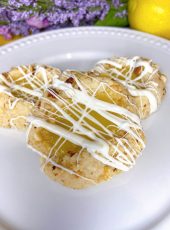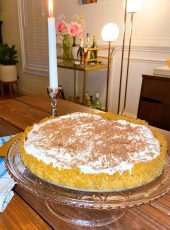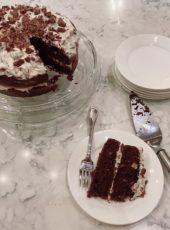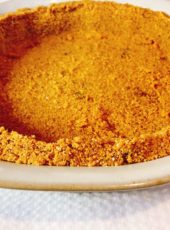The social history of pancakes brings us from Ötzi the Iceman to dad’s weekend specialty. These are an ultra-special version, with blueberries everywhere!
“Flitter me, flatter me floor, if you don’t give me pancakes, I’ll beat down your door.” – A chant, circa 19th Century England
Pancakes have been with us way way longer than you assume. They appear in America’s first cookbook, Amelia Simmons’ (1796) American Cookery, at that time referred to as “hoe cakes,” “johnnycakes,” or “flapjacks.” The Elizabethans of the 16th century ate pancakes made with sherry, rosewater, apples, and spices. YUM. Actually, wine and brandy were commonly used instead of milk as the mixing liquid before the 1800’s. The first written reference to pancakes was in the form of poetry by a Greek writer in 600BC. Famously, it’s believed that Ötzi the Iceman, a natural mummy of a man who lived some time between 3350 and 3105 BC, found in the Italian Alps in 1991, ate pancakes for his last meal before he trekked out on his last hike.
In the time they’ve had to get around the globe, they’ve come to have a lot of symbolism attached to them too. Linguistically, the saying “flat as a pancake” has been a turn of phrase since the early 1600’s. More recently, in 2003, a study published in the Annals of Improbable Research, attempted to compare the relative flatness of pancakes and Kansas. Using a pancake from the International House of them, they created a topographic profile of a representative using digital image processing. They then compared that profile to the U.S. Geological Survey’s data on Kansas. If 1.000 represented perfect flatness, Kansas scored a 0.9997 and the Pancake scored a 0.957 – Kansas is flatter than a pancake. Some years later, in 2014, Geographers from Kansas offered a rebuttle in the journal Geographical Review – other states are even flatter. Among them: Florida, Illinois, North Dakota, Louisiana, Minnesota, and Delaware.

They’ve also been a symbol of religious purification. According to Historic UK, “Pancake Day” is a traditional feast day before the deprivation of Lent begins on Ash Wednesday. A British Fat Tuesday. Much more innocent than the connotations of ours. It’s more formal name, “Shrove Tuesday,” refers to the practice of Christians repenting their sins to be “shriven” of them. A bell would ring to call practitioners to confession, and that bell became known as the “Pancake Bell.” The ingredients were also thought to hold special religious significance: eggs = creation, flour = “the staff of life,” salt = wholesomeness, and milk = purity. History Today also offers that the “humble pancake” became a symbol of the social contract between the haves and the have nots. A tradition emerged by the 12th century of giving gifts, often food gifts, often pancakes, to servants, a practice that helped keep the peace in the midst of otherwise tense class divides. The receivers began to see this as a kind of “pancake privilege,” threatening rioting if the good will was revoked. Hence the quote in the opening of this post.
In Russia, Ukraine, and Belarus, they celebrate “pancake week” at the end of February, also in gluttonous preparation of the coming Lent. While recognized by the Greek Orthodox Church today, the holiday has Pagan roots meant to celebrate the end of winter and the coming of spring. Part of the celebrations include making fresh pancakes every day and eating as many as they can. The pancakes, more like French-style crêpes, represent the Sun. Eating them symbolizes consuming the Sun’s warmth and energy.

Perhaps the religious affiliation is the reason for the ubiquity of pancake breakfasts offered by churches. Or maybe it’s a just an inexpensive way to satisfy a large crowd. UNH Today explains that their university has held a pancake breakfast every year since 1992 to welcome their LGBTQ students and their allies. This tradition is actually to commemorate when their first Gay Straight Alliance lost a bid for a pancake breakfast with the state’s governor in 1974, hoping to challenge him on his unkind views toward them.
Pancakes also make their fair share of appearances in celebratory festivals and world record demonstrations. Since 1445, the UK has held pancake races as part of their pancake day celebrations. People dress up and race down the street, while tossing pancakes in a frying pan while they run. You have to toss it three times during the race to qualify, and the first woman to present her pancake to the bellringer wins a kiss from him. In another particularly British contest at Westminster School in London, a headmaster leads a procession of boys to the playground, a cook tosses a giant pancake over a bar measuring over 16 feet, and the boys fight for the biggest piece of the pancake for a money prize. There are world records for pancake flips. As of 2022, the current record holder is Australian celebrity chef, Brad Jolly, who performed 140 flips in 60 seconds. There are also world records for the most people flipping pancakes together.

The final thing pancakes symbolize to me is, perhaps oddly enough, fatherhood. If your dad cooked one meal for the family a week, what was it? While it may have been BBQ or Chili – man foods for other reasons, dads also have a cultural association with pancake breakfasts. In a 1981 issue of Western Folklore, Thomas Adler published “Making Pancakes on Sunday: The Male Cook in Family Tradition,” an article about how weekend morning pancakes exist as a rare exception to the rule that women are in charge of feeding the family. While what we might assume is special about weekend cooking is the increased freedom to prepare involved, exotic, or time-consuming recipes, dad weekend cooking becomes “special” because it’s his specialty dish, prepared the same way, on the same day of the week. Adler explains, “The very fact that dad usually makes pancakes on Sundays is enough to make it special to the rest of the family.”
Craig Michaels’ 1971 cookbook, titled “Sunday Breakfast: A Cookbook for Men,” explicitly names how weekend dad breakfasts illustrate the gendered division of labor, “Sunday breakfast, à la Dad, has been a tradition in my home for some 15 years now, and it’s a tradition that’s enjoyed by the whole family. Mother probably enjoys our Sunday breakfast most, as she gets a complete relief from her regular cooking chores.” Notice that for “Mother” it’s a chore, but for “Dad,” it’s a tradition enjoyed by the whole family. Adler succinctly describes this pattern of gendered cooking: “his is play, hers is work.” Both of these works are situated in the 1970’s and 1980’s, a time when it may have even been somewhat progressive for men to admit that they take over any cooking responsibility at all. What’s more surprising is that this dynamic has changed very little decades later. 2019 data from The Pew Research Center, reports that for married couples with children, women say they are responsible for about 80% of meal preparation, and about 80% of grocery shopping. Moms spend an average of 68 minutes a day on meal preparation, whereas men spend about 23 minutes per day.
My dad loves to cook, and he’s fantastic at it. I grew up watching Food Network with him and sharing recipes with each other is one of the ways that we bond to this day. My mom is a great cook, but she’s never loved it. But my mom did the lion’s share of the cooking when I was a kid. It wasn’t until my dad retired, and perhaps the years had shifted the culture enough, that he started cooking most of their meals. It’s a reminder to me that we all should do what we love, no matter what other people say about it. This recipe is based on my dad’s recipe. I added the blueberry compote. If you’d really like to serve it like he does, you’ll blast The Kingston Trio or Peter, Paul, and Mary in the background while you cook.
Blueberry Blueberry Pancakes
Recipe by MauraCourse: Breakfast, BrunchDifficulty: Easy2-3
servings20
minutes20
minutesMakes ~ 6-8 pancakes
Ingredients
- For the Blueberry Pancakes
1/4 cup butter, melted
1 1/4 cup AP flour
1/8 cup granulated sugar [See Note 1]
1 tsp baking powder
1 tsp baking soda
1/2 tsp salt
1 cup buttermilk [See Note 2]
1/4 cup milk [See note 3]
1 egg, separated
1 cup blueberries
butter for frying; butter, maple syrup, and blueberry compote for serving
- For the Blueberry Compote
1 cup blueberries
1/4 cup water
1/4 cup granulated sugar
1 TBSP lemon juice
1 TBSP cornstarch mixed with 1 TBSP cold water
Directions
- For the Blueberry Compote
- Make the compote first and set aside so it's ready to go when your pancakes are finished.
- Add 1 cup of blueberries to pan with water, sugar, and lemon juice. Allow to come to a steady boil over medium-high heat. Cook for 2 minutes.
- Add the cornstarch mixture (1 TBSP cornstarch mixed with 1 TBSP cold water). Mix. Allow the mixture to return to a boil and then cook until thickened (about 30 seconds - 1 minute).
- For the Blueberry Pancakes
- Place melted butter in a large bowl and set aside to slightly cool.
- In a medium bowl, whisk together flour, sugar, baking powder, baking soda, and salt.
- Add milks to melted butter and mix.
- Add egg yolk to milk mixture and whisk to combine.
- Slowly add in flour mixture and gently mix to combine. Avoid over mixing, but make sure flour is incorporated.
- In a small bowl, vigorously whisk the egg white for 30 seconds. You're looking for it to be foamy, no peaks needed. Gently fold the foamy egg white into the batter.
- A griddle works best, but use whatever pan you use to make pancakes - heat the pan to medium-high heat. Use a pat of butter to cover the pan.
- Using either 1/4 or 1/3 measuring cup (depending on what size you want your pancakes), scoop batter onto the pan.
- Immediately sprinkle blueberry onto the raw batter facing up.
- When the edges begin to crisp and bubbles appear in the batter, it's time to flip (about 3 minutes). Flip and allow the other side to cook (about 2 minutes).
- Keep pancakes warm in a 170F oven while you finish cooking your other pancakes (especially if you're not using a griddle.)
- Serve with butter, warm maple syrup, and blueberry compote.
Notes
- Note 1: My dad's recipe calls for 1/4 cup sugar. I half that because of the compote, but if you like your pancakes super sweet you can follow his lead.
- Note 2: I use low-fat buttermilk and it works perfectly; my dad swears that full-fat buttermilk is a must.
- Note 3: If you don't have cow's milk on hand, you can use buttermilk for the additional 1/4 cup.





